The Famous Actor: "I Felt Hashem Revealing Himself to Me"
Meir Delanga experienced clinical death, later his life was saved when he avoided boarding a command car that caught fire, yet he continued to sink into the secular world. Years later, as a successful theater actor, his life transformed.
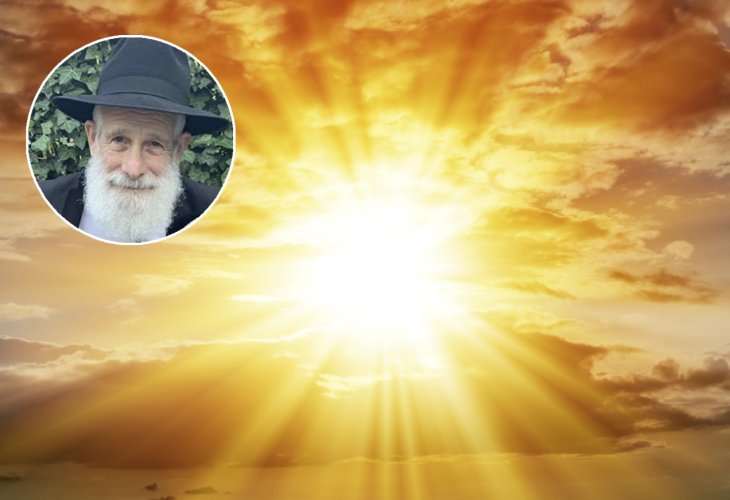 (In circle: Meir Delanga)
(In circle: Meir Delanga)The first day Meir Delanga entered a yeshiva, over 30 years ago, was the most surprising day of his life. No, he didn't intend to become a regular student; he just came to spend Shabbat there, as part of a process of curiosity and drawing near.
"I came with a bouquet of flowers," he recalls, "I simply didn't understand what a yeshiva was or what I was supposed to do there... Though I had already heard lectures on various topics in Judaism and had a little background, basic concepts were still foreign to me. For instance, when the yeshiva boys explained that I needed to 'wash hands,' I didn't understand what it meant. I thought about the word 'to wash' and concluded that it probably meant 'to take.' So I asked those around me, 'Whose hands do I need to take?' and didn't understand why everyone was holding back laughter. One of them tried to explain to me: 'to wash with the netilat yadayim cup,' and I was sure he was speaking a foreign language. What is a netilat yadayim cup and what are they talking about?"
When conversing with actor Meir Delanga, it's hard not to smile. He seasons his words with so much humor and amusing stories, as only an actor can. But it turns out that in his personal journey towards Judaism, there were quite a few difficult moments and obstacles. It wasn't easy for him to cope, and there were times when he almost broke. "To this day," he reveals, "there are days when I feel I have to really overcome my urges and break my bad habits with real effort. Who said that at my age it's easier to observe mitzvot?"
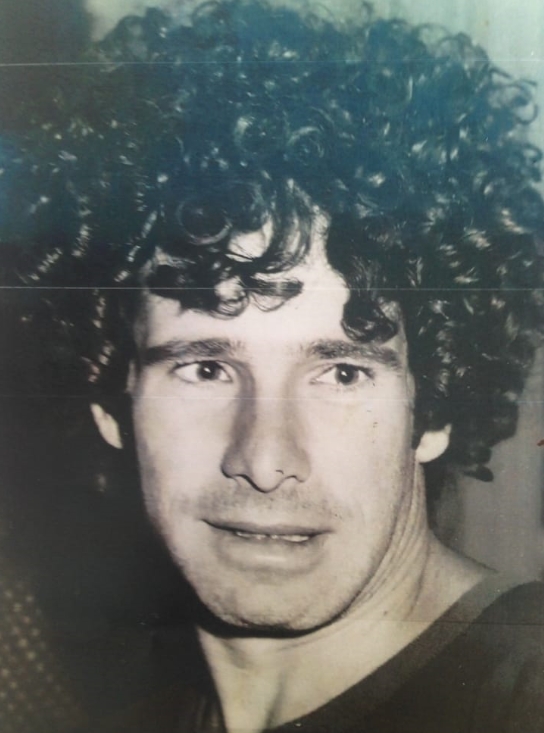
Clinical Death at Age 8
Delanga is a successful actor and mime, one of the familiar names from the Ben-Zvi School of Performing Arts. Even today, he continues to perform on stages, just from the other side of the spectrum, recounting his life's story.
"People see me performing and find it hard to believe that I looked completely different in the past," he says, "I come from a completely secular home. For years, neither I nor my siblings had a clue about Judaism. It's not that my parents had anything against religion; they just didn't know much. That's how we grew up, fourth generation of secularism."
However, Delanga shares that there is a story that has accompanied him since childhood and does not leave him. "My father is a Holocaust survivor. During the war, he lived in Holland, his parents were murdered, and he found himself alone in the world, moving from hiding place to hiding place, miraculously surviving each time. "
"One of the stories my father used to tell was about once escaping to a distant village from Amsterdam, hoping that the Nazis' long arm wouldn't reach there. In the village, he presented himself as a gardener and would tend to the residents' gardens, not revealing to anyone that he was Jewish. He even went to the Catholic church on Sundays, to prove that he had no ties to Judaism. "
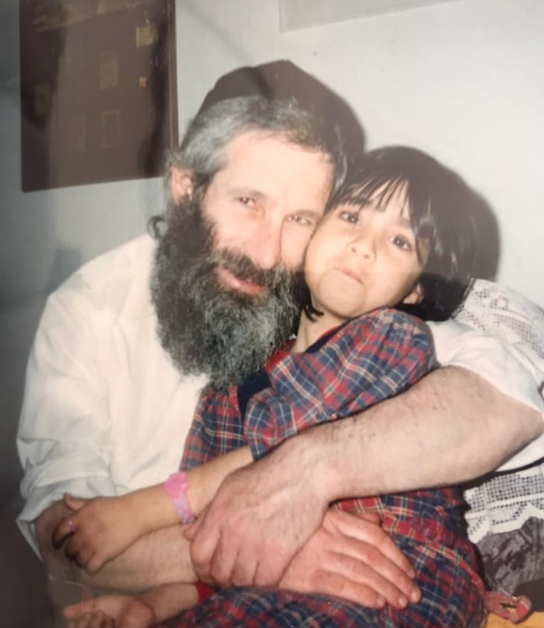
"One day, while he was in the church, Nazis stormed in, demanding everyone present identification papers. My father had nothing to show, as Jews were forbidden to hold identification, and he understood this could be his end. He began to shake all over, and then, at the last moment, an idea flashed in his mind - he decided to turn that fear-induced shake into one of anger. He started arguing with the person in front of him in line and shouted: 'Why are you pushing me?' He did it so convincingly, and now I think that perhaps my acting talent came from him. The Nazi commander who saw my father's actions shouted at him: 'You brat, come here,' lifted him in the air and roared: 'You're going out now to the winds,' and thus pushed him out of the church door to freedom. Later, I asked my father how he managed to devise such a brilliant solution while knowing his life was on the line, and my father answered with one sentence: 'It wasn't me, it was Hashem.'"
Delanga emphasizes again that the term 'Hashem' was occasionally heard in his childhood home, but he never understood that it required him to act in any specific way. Nevertheless, there were several situations in his life where he felt a definite closeness to Hashem. "When I was eight and a half, I experienced clinical death," he recounts, "it was at the end of a school day. I returned home and on the way, saw a two-meter-high ladder made of metal. I decided to climb up it and jump, but the jump went too bad. I fell to the other side of the ladder and got a strong blow to the back of my neck. At that moment I lost consciousness, and my friends called the gym teacher who performed CPR on me. Meanwhile, I remember myself floating above and seeing my body from the outside – how I lay with a bent leg and a hand behind my head. I remember my facial expression precisely, even though nearly sixty years have passed since then. This memory is deeply etched in me. Later, I learned this was clinical death. "
"Another incident where I felt Hashem close to me was during my military service. One day, my commander called me and informed me that he wanted me to recite 'Kel Maleh Rachamim' during a memorial ceremony for fallen IDF soldiers, where our unit was to participate. He handed me the paper, and I took it with me and got ready to go to the ceremony. I stood with other soldiers by the roadside and split up - some of us went into the truck and some into the command car. I intended to get into the command car and even had one leg inside, but at the last moment, my good friend came and pulled me out, insisting we ride the truck. I remember myself arguing with him, and he pulled me by force. So, we set out on the road, and after a kilometer and a half of travel, we heard a very loud 'boom' with a light flash. Our truck stopped, and we jumped out with weapons drawn, discovering a horrific scene: the command car had hit a mine, turned over, and began to burn. The soldiers who were inside, exactly where I was supposed to be, became part of the inferno. Many of them, sadly, did not survive. "
"I didn't make it to the ceremony that day, but after the truck led my shaken friends and me to where we were supposed to sleep, I noticed my hand clenched. When I opened it, I discovered the prayer: 'Kel Maleh Rachamim,' and I burst into tears... "
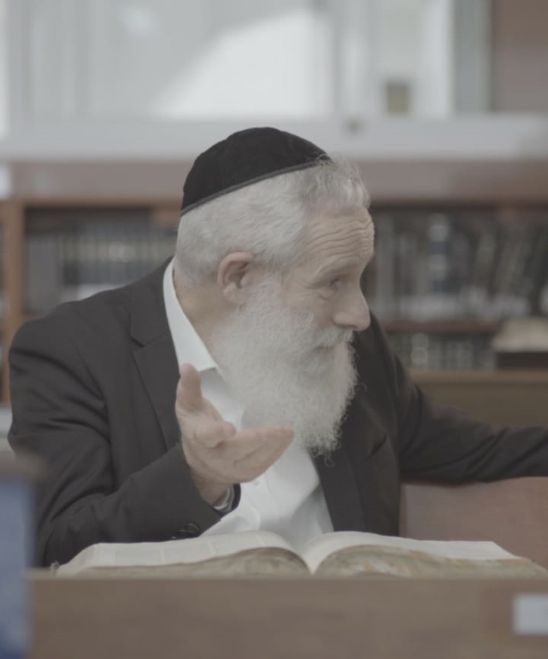
Not Religious, but a Believer
Despite the flashes here and there in his life, Delanga notes he continued with his secular routine. "After finishing the army, I decided I wanted to become an actor. During those years, I felt that the profession was ingrained in me and I already had some successful performances. That's how I started studying acting at the Ben-Zvi Theater, considered one of the leading places for teaching the performing arts. After graduating, I worked in acting for seven years, and I must say I was very frustrated. Even though I considered myself a talented actor, I received small and marginal roles, struggled to break into the world of success, felt I was wasting time, and not realizing my potential."
At age 30, he felt severely distressed, and then, without understanding why, decided one day to turn to Hashem in prayer. "I spoke to Hashem in my own words and asked Him to help me find a path to progress, so I could do something with myself and develop."
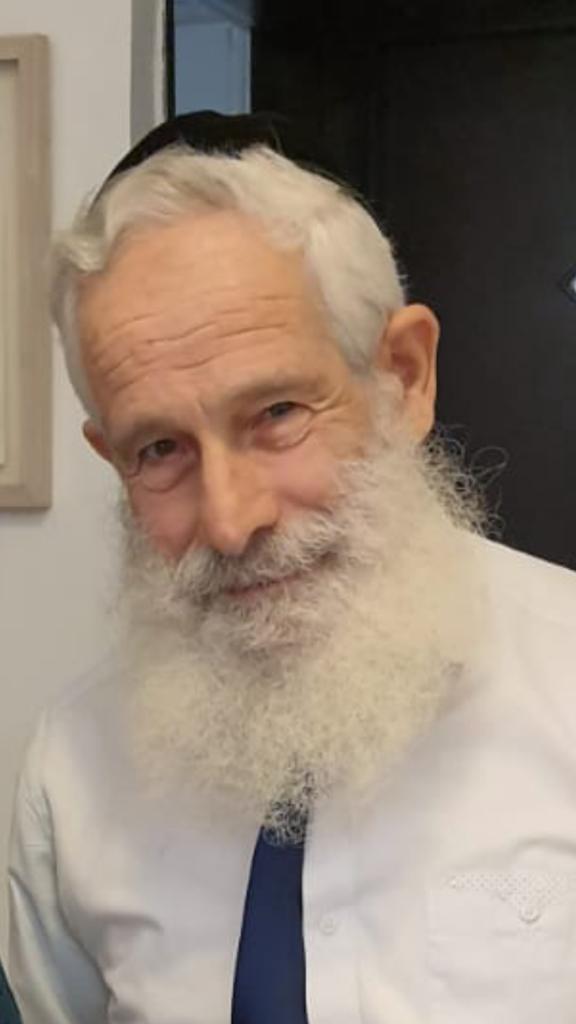
The next day it already happened: "I woke up in the morning with a brilliant idea for an independent play. I pounced on the task, feeling immense joy in my heart and very pleased with myself. Within a month, I had already written a program, refurbished it, built scenery, and started marketing myself around various clubs.
"One day, I performed at one of the major theaters, and at the end of the show, a reporter from a famous channel approached me, wanting to interview me about my program. I happily gave the interview, and at the end, he asked me: 'Where did these special ideas come from?' I found myself on live broadcast, publicly declaring, raising my hands to the heavens, and telling him the truth: 'It came from above.' The interviewer pressed with astonishment: 'But aren't you religious?' I said to him: 'True, but I believe the Creator hears prayers, see, it's a fact.' This was the first time I vocalized the feelings that had previously been deep in my heart – I believe in prayers and the existence of a Creator."
"Moshe is True"
From that moment, a wonderful process of repentance began, which Delanga himself struggles to explain. He attributes the first step to a good friend who came to visit him after having walked a substantial path in his life, from being completely secular to repenting and becoming a scholar.
"We sat together, he talked to me about his life, and I told him that I think he's saying things of substance and there seems to be a lot of logic to them. My friend decided to challenge me: 'If you truly see value in my words, then I have an idea for you. There's a place in Tel Aviv called 'Beit Naaseh v'Nishma', where they deliver lectures and Torah classes. Come visit it.'
"It already sounded to me like a bit much," Delanga recalls, "I explained to my friend that I'm very busy promoting my private show and have no time for lectures, but my friend responded with a short sentence: 'You're Jewish, right?' I answered him, offended: 'I'm definitely Jewish, and also my grandparents were murdered in the Holocaust just because they were Jewish.' 'If so', my friend told me, 'don't you think the time has come to finally check your Jewish roots?' It shook me. Two days later, I found myself at the 'Beit Naaseh v'Nishma' in Tel Aviv."
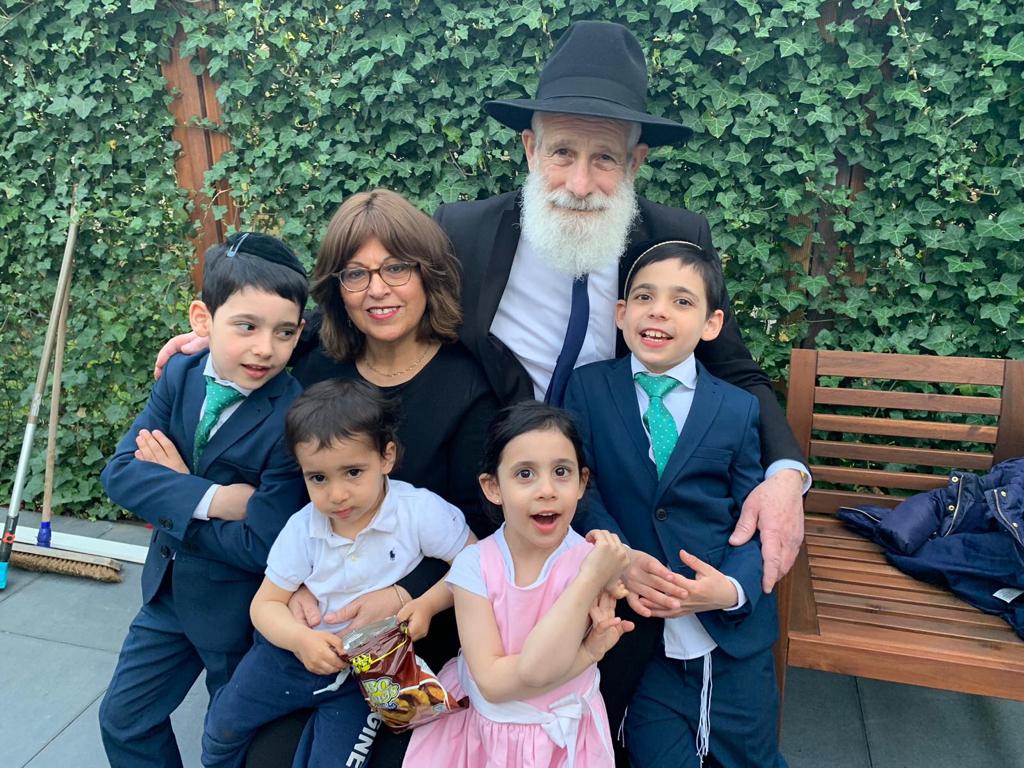 Meir Delanga with grandchildren
Meir Delanga with grandchildrenThe first class he heard was about the Book of Proverbs. "It was fascinating," Delanga recalls, "I entered the room without understanding anything and saw a large table, around which sat guys, each appearing to come from a different world, some with kippot and some bareheaded. In the center sat a lecturer who enthusiastically spoke about King Solomon and his words in the Book of Proverbs. He explained verse by verse, and I listened and felt myself truly being drawn into the discussion. I heard such correct and accurate explanations about topics like the human psyche and the roots of negative traits - jealousy, desire, and honor, which are exactly the things I encountered repeatedly in the competitive stage world. This class simply captivated me, and when it ended, I already knew I was signing up for the next one. So I continued to attend additional classes."
As mentioned, he later came to visit the yeshiva, convinced in his heart that it would be "just for one Shabbat." But that Shabbat led him to many inquiries and questions, which triggered participation in a five-day seminar. At the end of the seminar, he bought a kippah and tzitzit for the first time in his life, went on stage, and announced before hundreds of participants: "Moshe is truth and his Torah is truth."
Meir Delanga tears up with emotion when he talks about it. "More than 30 years have passed since then," he says, "and the kippah and tzitzit never leave me. I continued and still continue today to perform on stages, only now I am from the other side, aiming to strengthen and sanctify Hashem's name. I pray every day that Hashem continues to grant me the merit to see Him closely, and continue to feel the sweetness of the Torah and mitzvot."

